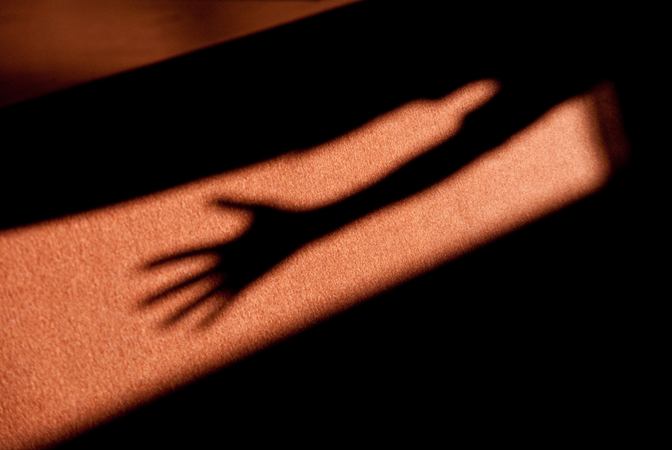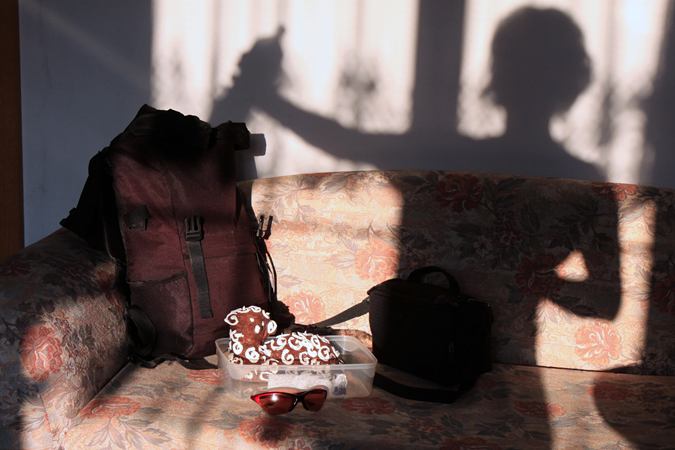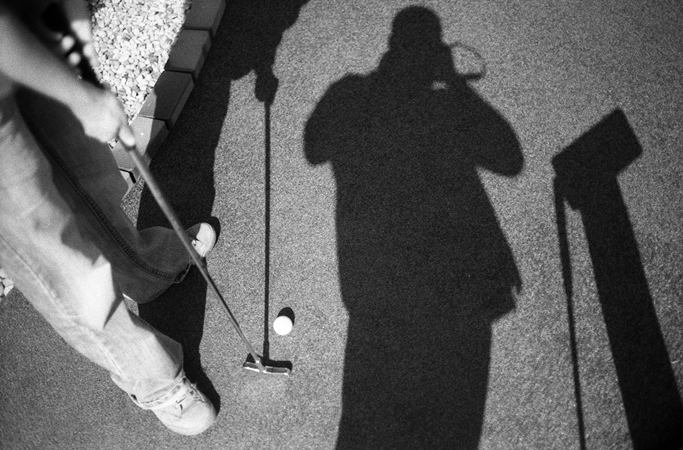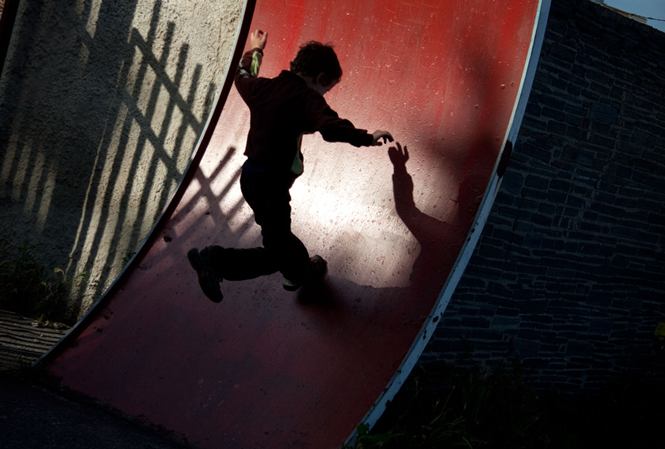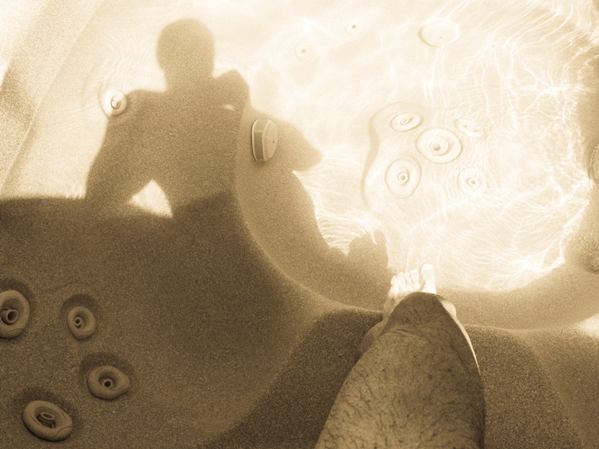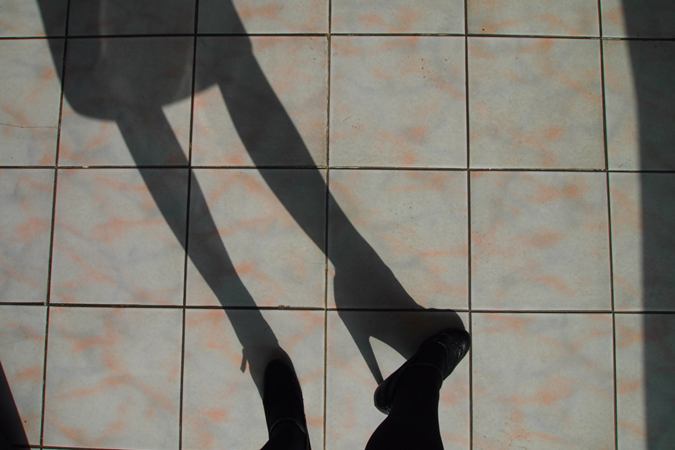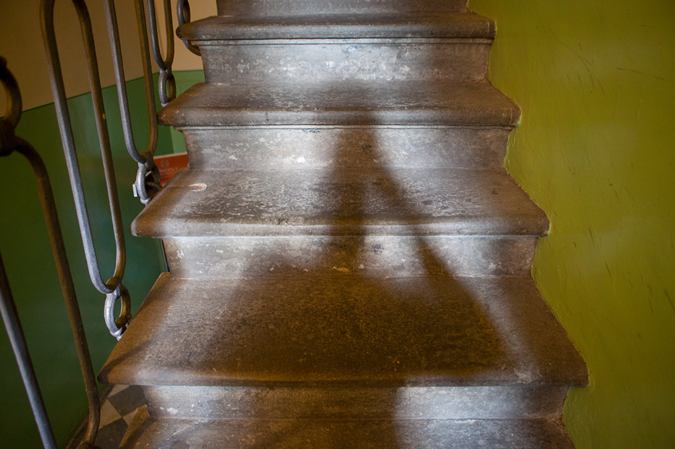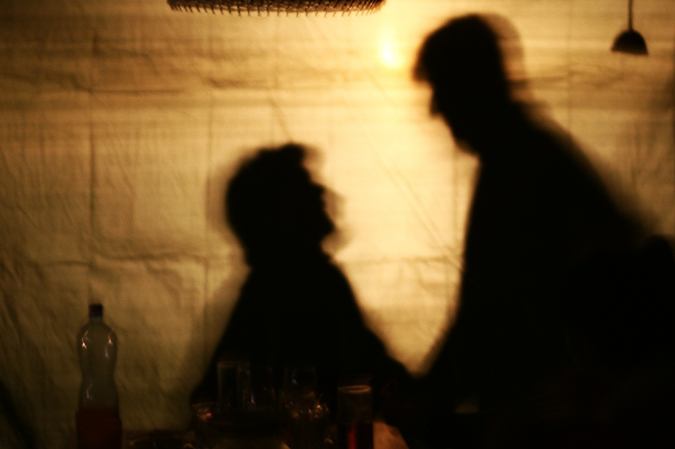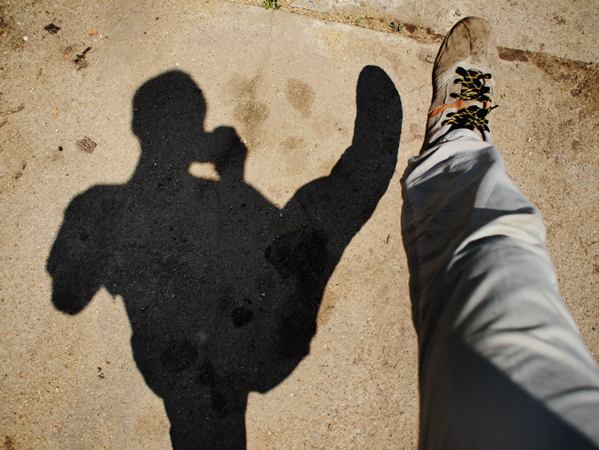Our life is largely influenced by the professions that we experience during the course of our lifelong existence. Each and every one is specific in its own way and has an interesting side to it, but there are certainly ones that ask for exceptional determination, nerve, or at times a large dosage of humor. Through the medium of our WoL users, employed in one of these so-called ‘unusual’ jobs, we would like to introduce the positives as well as negatives of each profession, but mainly look at the reasons behind the profession being so enticing and attractive.
Archiv autora: Zdeněk Kamrla
I want to disclose my privacy, says Zdeněk Dvořák
Thousands of stories, thousands of different situations. The Week of Life project shows everyday lives of tens of amateur photographers, emphasizing its message that none of them is ordinary. Take a look at how Zdeněk Dvořák, a special education needs teacher and tutor, documented his.
How does someone get to being a special education needs teacher? Why did you choose such a profession?
Well, the path to this profession was rather complicated and lengthy. After finishing elementary school at age 14, I decided to continue my studies in form of a pastry cook apprenticeship. After successfully graduating, I prolonged my studies at the technical school in Pardubice, top school in its field, majoring in food-processing technologies. I was consumed by the beauty of photography, but I went on to work within my field. One day, I received a letter from the army saying I was being recruited. Since I am opposed to any kind of army as such and really did not want to give up my hobby for an entire year, I decided to exercise my option to join mandatory civil service instead. As a result, I ended up in the Insitution of social care in Břežany near the city of Znojmo, where I worked as an assistant in the hippo therapy department and an auxiliary on the local home-stead. It was the first time that I came close to the disabled and during the 18 months that I’ve spent with them, I completely changed priorities and values in my life. At that precise moment, I felt the urge to document life and my surroundings with a camera, only for my civil service to end forcing me to return to my original profession. I regard myself as a creative person with a lust for change and working as a pastry cook did not really offer that. Especially when I worked at the choux pastry production and made thousands of Danish pastry each day, or during Christmas, when I spent several weeks doing nothing else than tiny vanilla crescents, which really drove my mind crazy, doing the same thing day after day. An offer came and I was promised a place at a photo-processing company, but I ended up as an assistant driver with a Škoda Felicia, in which I had to turn the heat on even during the summer so that the water in the engine wouldn’t boil over. Imagine that for 500 kilometers on a daily basis. Another offer came and this time from the Institution where I spent the above mentioned 18 months to avoid being recruited. I did not hesitate for one second. I was accepted as a tutor providing that I complete my education in the required field. I successfully achieved that and spent 4 great yeas in the Institution, where I met my future wife who worked at the home-stead as a caretaker for horses. Today, it has been three years since I started working at a boarding school, part of ‘Special schools of Znojmo’, where I attend to a group of 11 boys.
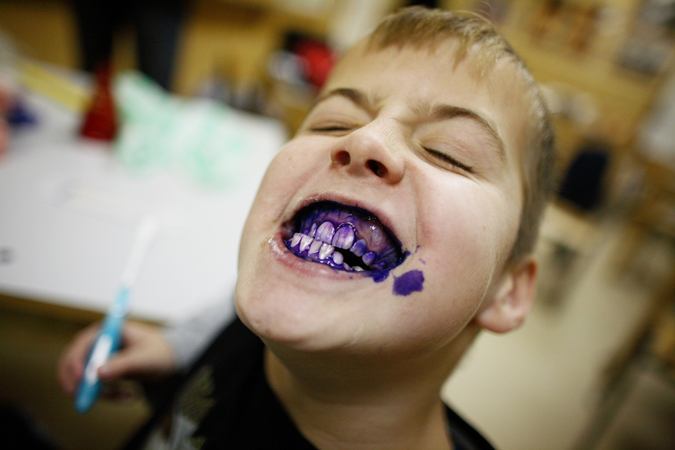
Our boarding school is often full of extraordinary adventures. This one time, we were able to witness a presentation about correct dental care done by the company Dental Alarm.
In what sense is this profession interesting? Have you experienced joy in your daily care for mentally ill children?
This profession is not demanding physically, but mentally. Come the end of the school year, we feel enormously exhausted and need a long rest. We experience a lot of solicitude and responsibility with this job, taking care of more than ten children’s souls, usually from a socially weak environment. Some have behavior disorders, others have mental or physical disabilities. This profession is not about getting rich and can’t be done for the money. You need to enjoy this kind of job and have a positive attitude towards children; a tranquil character is a must. You find yourself delighted with any kind of progress, when a boy makes his own bed or ties his own shoes. It’s exciting, since with every new day a new experience tags along. Nothing is set or outlined and to the basic things such as relaxing, completing homework and practicing self help care, are added the bits and pieces that usually stick to your memory for the rest of your life.
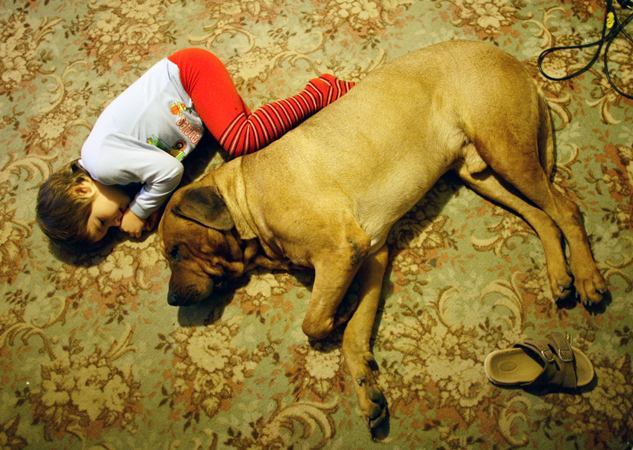
My four year old son likes playing with animals. With Taoš (dog Tosa – Inu role-played as his puppy).
Now, try to think of the moment a few years back when you faced the decision regarding where you want to work. Would you be tempted by something else or would you choose the same profession again?
I have a simple answer for that. I would gladly go through everything that I’ve written above again. I met my wife thanks to this job, we are expecting our second child now and as for photography, it has given me a certain direction, even though I did dream of traveling around the world with a camera in my hand. I come back to this dream once in a while, but my family is so much more important.

A lot of hay is needed for the horses we have. Some bundles of hay are so heavy that a special technique based on ‘live weight’ is needed in order for the hay to be stored in the hayloft.
Since we have already touched on the issue of photography, I would like to know the role it plays in your personal, as well as professional life?
This medium has played an enormous and full-valued role in my life. I got acquainted with it only during the 5th year of my apprenticeship, my main goal until that moment, only to find myself with my father’s Praktika as a mandatory accessory wherever I went, pursuing my hobby rather than my education. Today, it plays a part in my professional life as well. During wedding season, I document the first steps of married couples, but nevertheless, it’s only a secondary portion of my income. As far as my profession is concerned, I photograph children regularly. Basically everyday thanks to WoL. I used to take my camera with me only when we practiced canistherapy or went swimming, but that has changed over the last 5 months. Regarding my personal life, it influences me plenty, as my main photography subject deals with the family of my wife (the Prčík family). Photography also allowed me to visit Japan and Ireland and furthermore, I received a decent amount of awards. I think it would be a shame if I stuck with my old hobby as an exhibition budgerigar breeder.

We are eagerly awaiting our second child and it is also due to WoL that I attend all ultrasound scans and observe how our offspring is growing.
You are one of the first persons in the Czech Republic to actually take part in the fascinating documentary project Week of Life. In what way did this project become a part of your life?
When visiting my friend, long before the first ideas about WEEK OF LIFE came into existence, I admired the book called ‘THE LAST BOOK OF THE CENTURY’. It captured 24 hours of the Czech Republic on the date 10.10.2000. I was only a beginner then and never really gave this Week of Life project much thought. The first achievements started to come along, connected with ‘1 DAY OF THE CZECH REPULIC’ and a long-term project VIA LUCIS respectively. I simply enjoy such themes. Suddenly, a brand new thing came along and I was supposed to photograph a whole week with specific requirements, and unlike any previous project, capture essential images with only a few snapshots. I no longer waited for a sensational image to come by and had to document the most ordinary aspects of my life, unlock the door to my privacy and record a whole week. The first week was the hardest. I kept wondering if I’ll find something interesting to photograph. Regarding any kind of theme or subject, it is easy to document a week full of events or when we await something exceptional. But photographing constantly for several weeks? There is no more time for arrangements, you simply have to photograph everything that is going on around you and that has totally consumed me. You come to realize that life really is unique. I became addicted and nowadays, I tend to forget my keys at home rather than the 1 and a half kg heavy camera.

At the Prčík family (I’ve been photographing them for some time now, every time we pay them a visit. Sometimes, moments of celebration come along, such as success at the tractor races).
Do you think that people today are interested in the lives of others?
Why wouldn’t they be? Human beings are inquisitive by nature and like to inspect the fates of other people! No matter what you think or intend, this project opens up an insight into the privacy of others and presents a lot of revealing information. I came across many of the WoL users at different internet galleries, such as Barbara Havlíková, Ivana Gantnerová, Emilie Mrazíková and many others, and suddenly I am able to see them in their homes, with their families and so on. And of course I cannot overlook the fascinating chance to look at lives of people from remote countries and different cultures.

One of the main scopes of activity is the preparation for afternoon lessons.
You work as a special education needs teacher, taking care of mentally handicapped children. It is quite a serious issue. Does it involve moments of fun and laughter and if so, could you possibly share such a story?
We have a lot of funny moments at work, some which cannot even be published. Those moments you laugh about years and years after they happen. However, these delightful times are not the only satisfying moments that we have; the joy in children’s eyes is also something that brings pleasure and satisfaction. There are so many stories to be told. Since I was 17 I started losing parts of my hair, but I never cared much for shaving my beard. And one day one of my students asked me: ‘Mr. Tutor, why do you shave your forehead every day and let your beard grow? Is that the latest fashion?’ And now on a different note. When I still worked at the Institution in Břežany, we put together so-called individual plans. These included the short-term and long-term goals of the clients. Miladka was one of the girls in my group and wished for a digital camera. Unfortunately, we did not have the funds. At that time, I lent my DSLR to clients in terms of their therapy. We arranged a temporary studio, I set the camera and Miladka was able to role-play as a real photographer, taking pictures of her friends. I sent her best photos to the competition called ‘Life not only on wheels’. I received an award as well, but Miladka ranked higher in her category than I did and one of the prizes was a digital camera she constantly dreamed of. She was the first out of 170 residents of the institution to have her own digital camera.

The children experience the every day joys and sorrows and as their tutor, I’m a part of it.
What is it about your work that makes you so fulfilled and enriched?
There are various things. My job gives me meaning and only a slight progress connected with the children makes me happy. On the way to work, you can never tell what will happen during the day. When I first entered this sort of environment ten years ago, my life completely changed. I knew right there and then where I want to work and what I want to photograph. From that moment on, I have succeeded on both fronts. I started to perceive people around me in a different manner, learned to listen more and talk more. And believe me; it is priceless with regards to photographing people.
 |
 |
 |
 |
 |
Nová sekce: Moje profese
Náš život je z velké části ovlivňován i profesemi, které v průběhu našeho bytí vykonáváme. Každá z nich má svá specifika, je něčím zajímavá, ale existují i takové, u nichž je zapotřebí velkého odhodlání, pevných nervů a nebo třeba i velké dávky humoru. Rádi bychom vás prostřednictvím uživatelů WoL, kteří některou z těch ”neobvyklých” profesí vykonávají, seznámili s jejími pozitivy, negativy a hlavně tím, co je právě na této profesi tak lákavé.
Chci poodhalit své soukromí, říká Zdeněk Dvořák
Tisíce příběhů, tisíce situací. Projekt Week of Life ukazuje každodenní životy desítek amatérských fotografů a jeho poselstvím je, že žádný z nich není všední. Podívejte se, jak speciální pedagog a vychovatel Zdeněk Dvořák zdokumentoval ten svůj.
Jak jste se k Vaší profesi, kterou je speciální pedagog-vychovatel, dostal? Proč jste si zvolil právě ji?
No, cesta k této profesi byla celkem složitá a zdlouhavá. Po osmé třídě základní školy jsem se ve 14 letech rozhodl jít na učební obor cukrář. Po vyučení následovala náročná nástavba na Střední průmyslové škole potravinářské technologie v Pardubicích, která byla absolutní top v oboru. Během nástavby mě pohltila fotografie, ale šel jsem pracovat ve svém oboru. Jednoho dne přišel z vojenské správy dopis k dostavení se k odvodu. Armáda jako taková se mi příčí a já nechtěl být rok bez mého koníčku. Rozhodl jsem se tedy pro náhradní vojenskou službu. Ta mě zavedla do Ústavu sociální péče v Břežanech u Znojma, kde jsem byl jako asistent u hipoterapie a pomocná síla v místním hospodářství. Zde jsem poprvé přišel do úzkého kontaktu s lidmi s postižením a během těch osmnácti měsíců jsem přehodnotil dosavadní hodnoty života. V tuto dobu se u mě projevila chuť dokumentovat své okolí a život skrze fotoaparát.
Jenže služba skončila a já se vrátil k cukrařině. Myslím si, že jsem člověk kreativní a potřebuji mít změnu. Na cukrárně to však po mém návratu nebylo. Začal jsem totiž pracovat u výroby listového těsta a motat denně tisíc listových trubiček či o vánocích nedělat několik týdnů nic jiného než vanilkové rohlíčky mě ubíjelo. Stále stejný pohyb den co den. Vyskytla se šance dostat se do firmy, která zpracovávala fotografie. Jenže tam jsem skončil jako zastupující řidič ve felicii, ve které se muselo v létě topit, aby nevyvřela voda v motoru. Takto to bylo denně na 500 km. Vyskytla se šance uvolnění místa v ústavu, kde jsem strávil již zmiňovaných 18 měsíců, a já neváhal. Byl jsem přijat na místo vychovatele s podmínkou doplnění vzdělání. To se mi podařilo a já v tomto zařízení strávil krásné čtyři roky a poznal jsem tam i svoji manželku, která nastoupila v hospodářství jako ošetřovatelka koní. Nyní již tři roky pracuji jako vychovatel v ZŠ, MŠ a PrŠ Znojmo na internátě, kde mám skupinu jedenácti chlapců.

Na internátě se občas vyskytnou i nevšední zážitky. Jedním z nich byla prezentace správné péče o chrup společností Dental Alarm.
Čím je tento typ práce zajímavý? Zažíváte ve Vaší denní starosti o mentálně postižené děti i hodně radosti?
Tato práce není náročná fyzicky, ale psychicky. Ke konci školního roku pociťujete obrovskou únavu a potřebujete si odočinout. Na této práci je mnoho starostí a odpovědnosti. Máte zodpovědnost za více jak deset dětských duši, často ze slabších sociálních podmínek. Někteří mají poruchy chování, jiní problém mentální či zdravotní. Tato práce není na zbohatnutí a nejde dělat pro peníze. Musíte mít tuto práci rádi, kladný vztah k dětem a klidná povaha je povinností. Radost máte z každého pokroku ve škole, z prvního samostatně povlečeného polštáře či zavázaných tkaniček. Tato práce je skvělá, protože každý den jdete do něčeho nového. Nic nemáte nalinkované a k pevně danému základu jako je relaxace, plnění domácích úkolů, nácviku sebeobsluhy přibývají střípky, které vám zůstanou v paměti mnohdy na celý život.

Čtyřletý syn si moc rád hraje se zvářaty. S Taošem (pes Tosa-Inu) si hrál na jeho štěně.
Teď se zkuste na chviličku zamyslet a představte si, že byste se vrátil o pár let zpátky a rozhodoval se, kde budete pracovat. Volil byste stejně nebo by Vás lákalo dělat něco jiného?
Na tuto otázku mám rychlou odpověď. To co jsem napsal výše, bych klidně absolvoval znovu. I díky této práci mám ženu, čekáme druhé dítě a co se týká fotografie, dala mi jistý směr. I když jsem vždy snil o cestování s fotoaparátem po světě. Občas si na tento sen vzpomenu, ale moje rodina ho nevyčíslitelně převyšuje!

Pro koně, které máme, je potřeba mnoho sena. Některé balíky jsou tak těžké, že je nutné při jejich uskladnění do seníku použít speciální techniky „živého závaží“.
Když jsme u té fotografie, zajímalo by mě, jakou hraje toto médium roli ve Vašem profesním i soukromém životě?
Toto médium je obrovskou a plnohodnotnou součástí mého života. Srazil jsem se s ním až během pátého roku studia oboru cukrář, které bylo do té doby mým hlavním cílem a tátova Praktika byla najednou povinnou výbavou kamkoliv jsem jel. Nyní je to i součást profesní. Během svatební sezóny dělám památku novomanželům, ale vždy se jedná až o druhou část mých příjmů. Co se přímo mé profese pedagoga týká, fotografuji život dětí pravidelně. Díky WoL již každý den. Dříve jsem si fotoaparát bral např. jen když byla canisterapie či plavání, ale to již více jak 5 měsíců neplatí. V soukromí ovlivňuje měrou vrchovatou, vždyť mé hlavní téma fotografie (Prčíkovi) se týká rodiny mojí manželky. Díky fotografii jsem se podíval do Japonska, Irska a získal slušný počet ocenění. Myslím, že by byla škoda, kdybych zůstal u svého předchozího hobby, kterým byl chov výstavních andulek.

Čekáme druhého potomka a já i díky WoL chodím na všechny ultrazvuky a sleduji, jak naše mimčo roste.
Jste jeden z prvních, kdo se v České republice zůčastnil fascinujícího dokumentárního projektu WEEK OF LIFE. Jak tento dokument vstoupil do Vašeho života?
Dávno předtím, než vznikla myšlenka projektu WEEK OF LIFE, jsem u svého kamaráda obdivoval POSLEDNÍ KNIHU STOLETÍ. Zachycovala 24 hodin ČR dne 10.10.2000. Já jsem tehdy teprve začínal a o tomto projektu ani nezauvažoval. Poté přišel úspěch v podobě podobného projektu 1 DEN ČESKÉ REPUBLIKY, následně dlouhodobý projekt VIA LUCIS. Prostě mě podobná témata baví. A najednou se objeví něco úplně jiného. Mám nafotit týden s danými pravidly. Nikoliv jako v předchozích projektech zachytit jediným záběrem nebo více jednotlivými záběry to podstatné. Nehledám najednou senzaci, ale úplně obyčejné momenty kolem sebe. Pootevřít své soukromí a zachytit celý týden. První týden byl velmi náročný. Pořád jsem přemýšlel, jestli se bude dít něco zajímavého. Ono co se témat týká, dá se týden nafotit v době, kdy nás čeká něco výjimečného. Ale fotit takto souvisle několik měsíců? Zde už nic nahrát nejde, prostě fotíte to, co se děje a to mě pohltilo. Uvědomíte si, že váš život žijete neobyčejně. Stalo se mi to závislostí a nyní nechávám doma častěji klíče od práce než kiloapůl těžký fotoaparát.

U Prčíkových (fotografuji je několik let při každé návštěvě). Naskytnou se však i slavnostní momenty jako třeba úspěch na závodech traktorů.
Myslíte, že lidé dnes mají zájem o životy ostatních lidí?
A proč by něměli mít zájem? Lidé jsou přirozeně zvědaví a baví je dívat se na osudy ostatních! Tady se vám chtě nechtě pootevřou pohledy do soukromí a řeknou mnohé. Z
internetových galerií jsem v rámci WoL znal jména jako třeba Barbara Havlíková, Ivana Gantnerová, Emilie Mrazíková a mnoho dalších, a najednou je zde vidím v jejich domově, s jejich rodinou. A sledovat životy lidí ze vzdálených zemí a kultur je taktéž úžasné.

Jednou z hlavních náplní činnosti je odpolední příprava na vyučování.
Jste speciální pedagog, pracujete s postiženými dětmi, to je vážné téma, dá se ale u toho zažít také nějaká legrace? A pokud ano, máte jednu historku v kapse k dobrému?
Legrace je mnoho, některé momenty se nedají ani publikovat. Člověk se jim mnohdy směje ještě několik let poté, co se udály. Radost vám přinášejí nejen humorné zážitky, ale i radost dětí jako taková. Příběhů je mnoho. Od sedmnácti let mám kouty na čele a přitom se moc neholím. Jednoho dne se mě jeden z chlapců zeptá: „Pane vychovateli, a proč si holíte každý den čelo a vousy si necháváte. To je nová móda?”
A nyní radost z jiného soudku. V době, kdy jsem ještě pracoval v domově v Břežanech, vypracovávaly se tzv. individuální plány. V nich byly krátkodobé a dlouhodobé cíle klientů. Miladka byla jednou z děvčat z mé skupiny, která si přála fotoaparát s televizkou. Jenže na to nebyly peníze. Tehdy jsem vybraným klientům půjčoval v rámci terapií svoji digitální zrcadlovku. Připravil se provizorní ateliér, nastavil jsem aparát a Miladka si zahrála na skutečnou fotografku, kdy fotila své kamarádky. Nejlepší fotografie jsem poslal do soutěže „Život nejen na kolech“. Já se umístnil také, ale Miladka získala vyšší ocenění ve své kategorii než já a jednou z cen byl její vysněný digitální kompakt. Byla první ze 170 obyvatel domova, kdo měl svůj vlastní digitální foťák.

Děti prožívají své každodenní starosti i radosti a já jako vychovatel jsem jejich součástí.
Co Vás na Vaší práci obohacuje?
Je toho mnoho. Tato práce mi dává smysl a mám radost z každého sebemenšího pokroku dětí. Jdete do práce a nikdy nevíte, co se bude dít. Když jsem téměř před deseti lety poprvé přišel do tohoto prostředí, změnil se mi život. Věděl jsem najednou, kde chci pracovat a věděl jsem, co chci fotografovat. Obojí se mi od té doby plní. Vnímám jinak lidi kolem sebe, naučil jsem se lidem více naslouchat a povídat si s nimi. A věřte, že pro fotografování lidí je to věc k nezaplacení!
 |
 |
 |
 |
 |
Akční nabídka společnosti Megapixel pro členy WoL
společnost Megapixel.cz, která je naším hlavním partnerem, si pro vás připravila skvělou letní akční nabídku, která se vztahuje na fotografické vybavení. Pokud se tedy chystáte doplnit či nakoupit nový sortiment, neváhejte a využijte některou z následujících slev.
20% sleva na pouzdra, brašny, batohy Lowepro a Vanguard
15% sleva na stativy Manfrotto a Velbon
15% sleva na paměťové karty Kingston a Sandisk
Více o této akční nabídce naleznete na stránkách Megapixel.cz.
Hezký den a dobré světlo Vám přeje tým WoL
Shadowplay
Who wouldn’t remember the times when we as little children passed the time before falling into the world of dreams by using the lamp’s light to create all sorts of shapes of animals and such on the wall, or at least relentlessly demand it from our parents. The game with lights and shadows has its immortal charm, fascinating us even as adults, which you have so convincingly confirmed numerous times. In a matter of seconds, we become skinny and tall or on the contrary, the most adorable tiny midgets shaped on the side of the street, where only a passing look at the shadows cast by ourselves or people around us is just enough to get out of the everyday dose of worries and frowns. Join us on the journey to the world of silhouettes – a world that lures you in by its simplicity and anonymity, and compare yourselves in the light of shadows.
Michaela Trčková, Student, Czech Republic
Stanko Abadzic, Teacher, Croatia
Jiří Heller, Photographer, Czech Republic
Mila Štáfek, Worker,Czech Republic
Martin Rupert,Enterpreneur, Czech Republic
Ctibor Košťál, Photographer, Czech Republic
Jan Nožička, Photographer, Czech Republic
Lenka Pužmanová, Graphic designer, Czech Republic
Zdeněk Dvořák, Special education needs teacher, Czech Republic
Barbara Havlíková, Parental leave, Czech Republic
Stanislav Pokorný, Photographer, Czech Republic
Alex Galmenau, Photographer, Romania
Jan Watzek, Student, Czech Republic
Lucie Lisníková, Student, Czech Republic
George Ksandr, Photographer, Germany
Vladimir Yurkovic, Graphic designer, Slovakia
Šárka Lisníková, Cook, Czech Republic
Lubomír Kotek, Photographer, Czech Republic
Lubomír Budný, Student, Czech Republic
Miguel Apolinario, Photographer, Portugal
Jan Novotný,Engineer, Czech Republic
Jan Neubert, Photographer, Czech Republic
Zdeněk Dvořák, Special education needs teacher, Czech Republic
Barbara Havlíková, Parental leave, Czech Republic
Jan Nožička, Photographer, Czech Republic
Ivana Gantnerová, Architect, Czech Republic
Romek Hanzlík, Musician, Czech Republic
Helena Horáčková, Design engineer, Czech Republic
Martina Matějková,Technician, Czech Republic
Ivo Hausner, Photographer, Czech Republic
Jan Watzek, Student, Czech Republic
Stanko Abadzic,Teacher, Croatia
kevin v. ton, Graphic designer, Czech Republic
Jiří Urban, Scientist, California
Zuzana Bobovníková, Photographer, Czech Republic
Stanislav Pokorný, Photographer, Czech Republic
Věra Kurcová, Businessperson, Czech Republic
Zdeněk Dvořák, Special education needs teacher, Czech Republic
Mila Štáfek, Worker, Czech Republic
Jan Nožička, Photographer, Czech Republic
Alex Galmenau, Photographer, Romania
Martina Štolbová, Teacher, Czech Republic
Barbara Havlíková, Parental leave, Czech Republic
Zdeněk Dvořák, Special education needs teacher, Czech Republic
Stínohra
Kdo z nás si jako malé dítě nekrátil chvíle před ponořením se do hlubin spánku tím, že ve světle stolní lampičky kouzlil rukama na stěnách všemožná zvířátka a obrazce či to neúnavně vyžadoval na svých rodičích. Hra světel a stínů má však své nesmrtelné kouzlo, které nás uchvacuje i v dospělosti, což jste nám v mnoha případech potvrdili. Na ulici se z nás během chvilky stávají vyhublí dlouháni či naopak roztomilí pidi človíčkové a kolikrát jen letmý pohled na stín, který vrháme my sami nebo někdo z kolemjdoucích, nás na chvilku vytrhne z všedních chmur a starostí. Vydejte se tedy s námi do světa siluet – světa, který láká svou jednoduchostí a anonymitou a porovnejte se ve světle stínů.

Michaela Trčková, Student, Česká republika

Stanko Abadzic, Učitel, Chorvatsko

Jiří Heller, Fotograf, Česká republika

Mila Štáfek, Dělník, Česká republika

Martin Rupert, Podnikatel, Česká republika

Ctibor Košťál, Fotograf, Česká republika

Jan Nožička, Fotograf, Česká republika

Lenka Pužmanová, Grafik, Česká republika

Zdeněk Dvořák, Speciální pedagog, Česká republika

Barbara Havlíková, Mateřská dovolená, Česká republika

Stanislav Pokorný, Fotograf, Česká republika

Alex Galmenau, Fotograf, Rumunsko

Jan Watzek, Student, Česká republika

Lucie Lisníková, Student, Česká republika

George Ksandr, Fotograf, Německo

Vladimir Yurkovic, Grafik, Slovensko

Šárka Lisníková, Kuchař, Česká republika

Lubomír Kotek, Fotograf, Česká republika

Lubomír Budný, Student, Česká republika

Miguel Apolinario, Fotograf, Portugalsko

Jan Novotný ,Inženýr, Česká republika

Jan Neubert, Fotograf, Česká republika

Zdeněk Dvořák, Speciální pedagog, Česká republika

Barbara Havlíková, Mateřská dovolená, Česká republika

Jan Nožička, Fotograf, Česká republika

Ivana Gantnerová, Architekt, Česká republika

Romek Hanzlík, Hudebník, Česká republika

Helena Horáčková, Konstruktér, Česká republika

Martina Matějková, Technik, Česká republika

Ivo Hausner, Fotograf, Česká republika
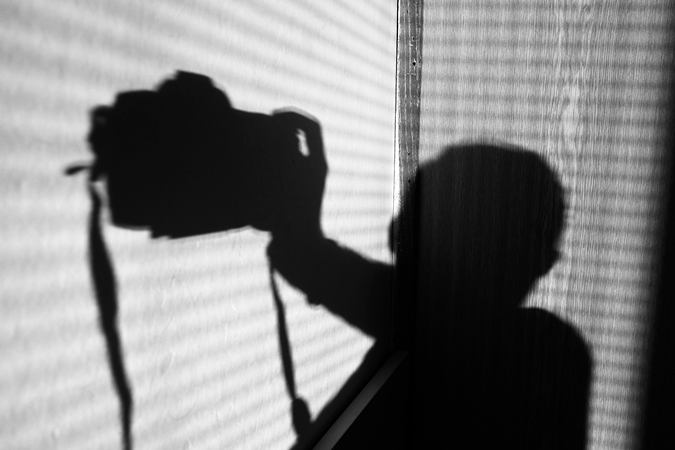
Jan Watzek, Student, Česká republika

Stanko Abadzic, Učitel, Chorvatsko

kevin v. ton, Grafik, Česká republika

Zuzana Bobovníková, Fotograf, Česká republika

Stanislav Pokorný, Fotograf, Česká republika

Věra Kurcová, Obchodník, Česká republika

Zdeněk Dvořák, Speciální pedagog, Česká republika

Mila Štáfek, Dělník, Česká republika

Jan Nožička, Fotograf, Česká republika

Alex Galmenau, Fotograf, Rumunsko

Martina Štolbová, Učitel, Česká republika
The sewer drain
Not far from my house, there is a larger street that plays a fundamental role in my daily commute. One day, while waiting for the traffic light to turn green, I was on my bike and suddenly realized that there was something different that day.I glanced at the sewer drain ahead of me, or rather below me. The city workers were cleaning the area and, in the course of a long chain of events, probably neglected a very important part of the job – putting the lid back on properly. I immediately grasped the opportunity. I have a personal connection to this photograph for several reasons.
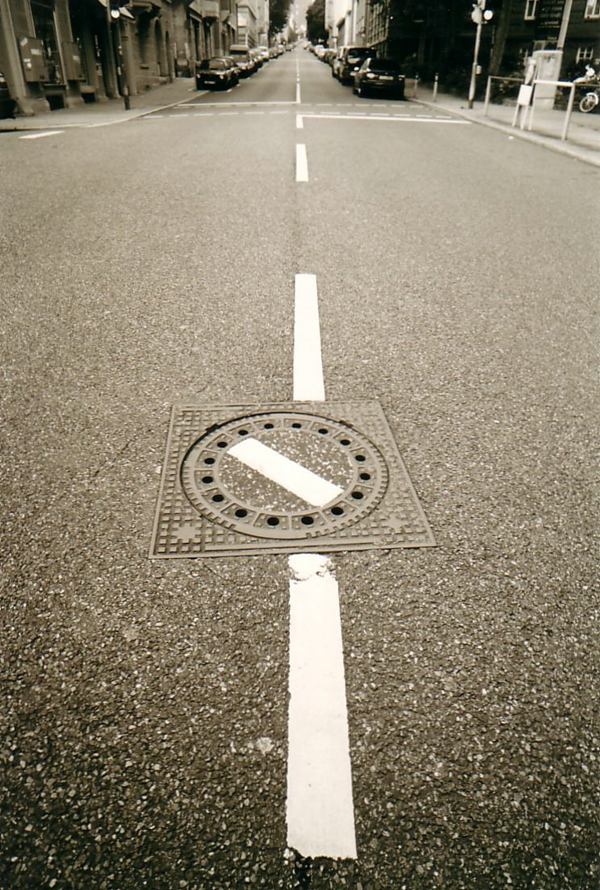
It is one of the three photographs for which I have had to sacrifice my sleep and wake up very early – and surely, nobody likes that. The road is very busy during the day, making any kind of documentation impossible. The only possibility that remained was to go Sunday at dawn.
I enjoy this photo in particular, since it shows how little suffices, in graphic terms, for a picture to tell a variety of stories. One might ask if the workers were so careless and foolish that they failed to notice that the lid was not placed correctly, if they noticed their unintended joke but left it as it was, or if they did it ‘just for fun’. No one but them will ever know..
What I like about this photo the most is the fact that it proves how traveling to different parts of the world is not the only way to discover new things. The sewer drain is situated 150 meters away from the entrance to our house. I remind myself of that every time I see this photograph.
A few months later, the street was reconstructed and the white lines were gone. The only thing that remained was my photographic documentation of how ridiculous the world can be.
Kanál
Nedaleko mého domu vede hlavní silnice, po které chodím nebo jezdím téměř denně. Jednoho dne, když jsem čekal na kole na semaforu, všiml jsem si, že “dnes je něco jinak“.Můj pohled padl na kanál přede mnou nebo spíš pode mnou. Pracovníci města zde něco čistili a při kladení víka zpět zřejmě ztratili z očí vnější souvislost. Pochopil jsem hned svou šanci. Fotografie je pro mě osobně významná z několika důvodů.

Je to jedna ze tří fotek, kvůli kterým jsem musel hodně brzo vstávat – což nemá rád asi nikdo. Ulice je přes den hodně frekventovaná, a tak by bylo focení jinak nemožné. V úvahu připadala bohužel jen neděle za svítání.
Na fotografii se mi líbí, že je na ní ukázano, jak málo (graficky) stačí, aby se mohli vyprávět různé příběhy. Člověk se ptá, jestli byli pracovníci tak hloupí a nevšimli si jak to má být správně či si všimli svého nechtěného vtipu, ale už to tak nechali a nebo to udělali schválně “just for fun”? To už se asi nikdo nedozví.
Na tomto snímku je pro mne ale nejdůležitější skutečnost, která je důkazem toho, že není potřeba procestovat celý svět, aby člověk objevil něco nového. Kanál se nachází 150 metrů od vchodu do našeho domu. Pokaždé, když tu fotografii vidím, tak si to připomínám.
O několik měsíců později byla ulice přestavěna a bílé čáry byly všude smazány. Zůstalo jen svědectví o komičnosti světa.
Children of the Sun
Juraj Sucharda, Businessperson, Slovakia
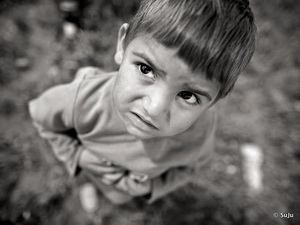 They live amongst us yet they live in their own world. Their community is their all and to be excluded would be too much to bear. They protect their privacy and are regarded as problematic citizens that are hard to get along with, being avoided by their neighbors as a result. We are talking about the Romany people, who, for unknown reasons, long ago decided to abandon India and wander to Europe, where they decided to settle and call it their new home. Their eyes sparkle with wildness and desire for adventure. But how do they really live? What are their concerns and how do their homes look? You can find the answers in today’s reportage created by Juraj Sucharda, who journeyed with his camera to places usually forbidden to ‘the white man’. (WoL)
They live amongst us yet they live in their own world. Their community is their all and to be excluded would be too much to bear. They protect their privacy and are regarded as problematic citizens that are hard to get along with, being avoided by their neighbors as a result. We are talking about the Romany people, who, for unknown reasons, long ago decided to abandon India and wander to Europe, where they decided to settle and call it their new home. Their eyes sparkle with wildness and desire for adventure. But how do they really live? What are their concerns and how do their homes look? You can find the answers in today’s reportage created by Juraj Sucharda, who journeyed with his camera to places usually forbidden to ‘the white man’. (WoL)
I am not sure if I am too confident within the social sphere of society. It was only when my wife started attending university, specializing in this subject matter, I unintentionally looked into it further. The right moment came not long ago, when we visited a community center near the city of Košice. A young man bid us welcome – a man of Romany decent, a classmate. The excursion followed right after a short conversation and, in my point of view, we crossed the borders into a whole different world inaccessible to many.
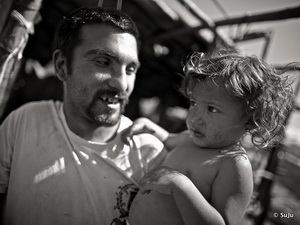 On the way to the settlement, I learned about the classic problems of finance, lack of support and understanding, the unwillingness of the government to help, as well as about the dreams, wishes and efforts to change the norms in this country. Initially, I wanted to document a Week of Life of one of the local mothers from the settlement, but the mentality and fear of the unknown forbid them (and me) to fulfill this idea.
On the way to the settlement, I learned about the classic problems of finance, lack of support and understanding, the unwillingness of the government to help, as well as about the dreams, wishes and efforts to change the norms in this country. Initially, I wanted to document a Week of Life of one of the local mothers from the settlement, but the mentality and fear of the unknown forbid them (and me) to fulfill this idea.
When we reached the crossroads on the way to the settlement, I have to admit I was worried, impatient but most of all, I had no idea what i got myself into. Luckily, we were accompanied by a guide; otherwise, I would have met with averseness rather than a warm welcome. I was immediately told a story of a photographer losing his equipment while touring the settlement.
The guide brought us to a small ‘house’ built from various bricks. The roof was hard to identify with tires all over it and everywhere you looked there was a pile of dirt along with surprisingly happy and satisfied children. A 35 year old lady greeted us with a toothless yet sincere and kind smile. She gathered together her 10 kids; I can’t remember the names, but their ages were between 9 months and 15 years. Our guide informed us that she is one of the few to use the intrauterine device, since she wouldn’t be able to afford any additional babies. Especially in a house with a 9m2 total area, despite the fact that based on the decree of the National Council of the Slovak Republic, NR SR 259/2008, the lowest standard of flats is supposed to be at least 12m2 per tenant and no less than 6m2 per every additional tenant. The useful floor space has to be at least 15m2. The luxury of a clean bathroom, heating and access to clean water is still only a distant wish; nevertheless, the children were clean and groomed. She invited us in and treated us with a cup of tea.
„The luxury of a clean bathroom, heating and access to clean water is still only a distant wish; nevertheless, the children were clean and groomed.”
We entered the cozy dwelling, which was clean and tidy, opposite to what I’ve imagined. Beds were made, pajamas aligned in piles, tea cups on the shelves with handles facing the window and the soup was boiling on the stove. At that moment, our baby girl started to cry and my wife had to take her out of the stroller and breast feed her right there in the house – our hosts reacted immediately and addressed a question our way: ‘Even white people have kids now? We realized how well off we are and continued further in the excursion.
We indulged into another conversation with the guide and found out more about the community as a whole. I asked why the children weren’t at school and the guide answered right away: ‘The oldest girl has already finished compulsory education, now she is waiting for an eligible groom. And the younger kids are waiting for afternoon classes, since the local school does not have the capacity for everyone to attend the morning lessons. Funds haven’t been approved yet, despite the project waiting for ratification for several years now’. To answer another one of my questions, why they have so many children, our guide answered in a broad interesting manner: ‘They have failed to understand the concept of birth control, they have insufficient information and no one from the majority of the population cares – for example, arranging for a social worker to be present at hospitals, explaining to pregnant women the options they have (birth control, sterilization).’ ‘In 1972 for instance, due to the Romany minority negatively affecting the statistics regarding health of the population, Romany women were given an option to be sterilized in exchange for a ‘reward’ that was supposed to compensate for the mother’s stay at the hospital. This immediately evoked a negative response outside the borders of ČSSR.’
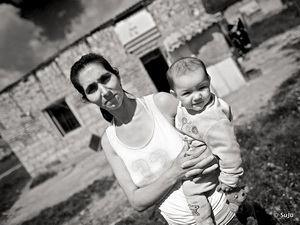 |
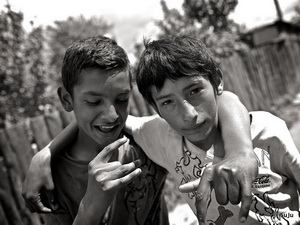 |
I kept asking and wondered about the coexistence of families, friends and children. I found out that the wife has to be 100% faithful, otherwise she becomes an outcast of the society. On the contrary, she is required to tolerate infidelity of her husband. When someone upsets them, they can get seriously angry, but afterwards, the conciliation is way more sincere. Moments after, we entered another dwelling. It was bigger than the previous one with a satellite above the doorway. The house was clean and on the bed, we saw a one year old sucking on milk.
The next stop was a trailer house. Here, we actually felt real poverty. The money they receive is spent on rice, flour, potatoes. Children primarily eat cookies from an oven, included in most of the dwellings. Based on proper paperwork, community centers supervise parents of children living in a foster house, check on projects, help the ones in need and so on. This is due to the fact that many of them only barely finished primary education, becoming dependent and in need of guidance in matters of organizing work within their settlements, handling legal affairs or abiding to school attendance, as well things they fail to understand and handle themselves.
„The wife has to be 100% faithful, otherwise she becomes an outcast of the society. On the contrary, she is required to tolerate infidelity of her husband.”
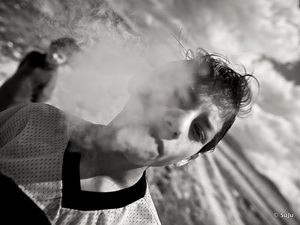 |
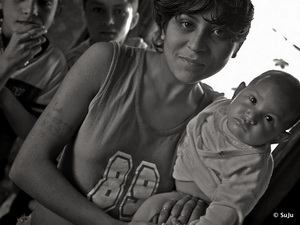 |
They require love, sensibility, understanding, rules and borders, because they are weak and heavily dependent. There are definitely exceptions; we aren’t all the same ourselves. Personally, this experience changed my perspective, my views and opinions. We need to take them by the hand like children and teach them to live, believe, love and protect.
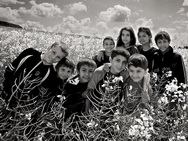 |
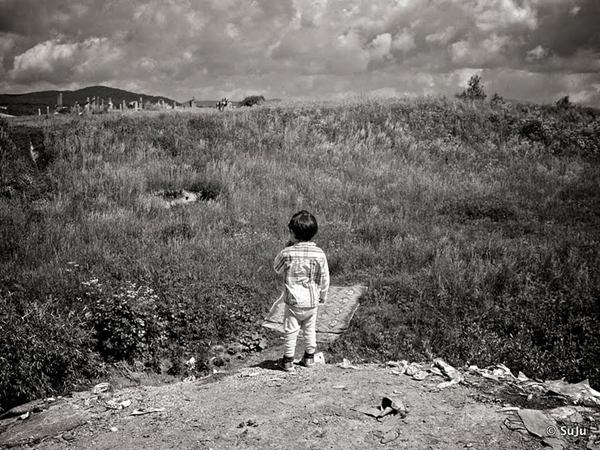 |
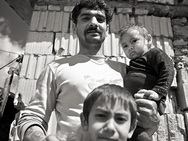 |
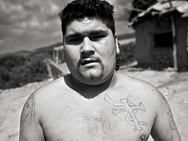 |
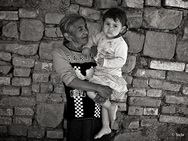 |
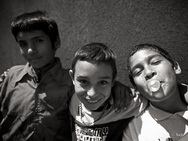 |
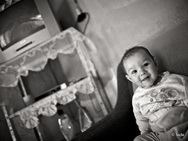 |
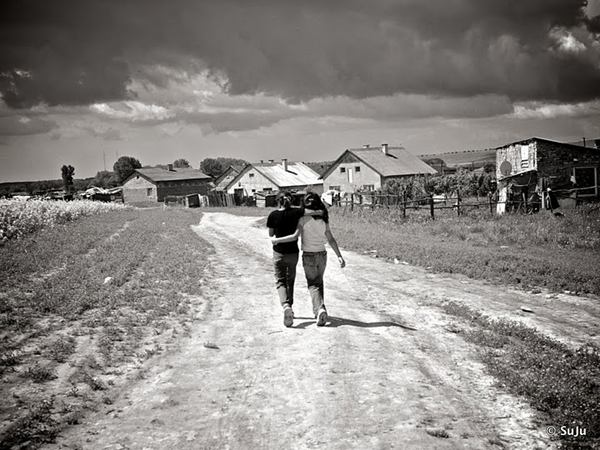 |
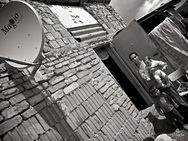 |


























